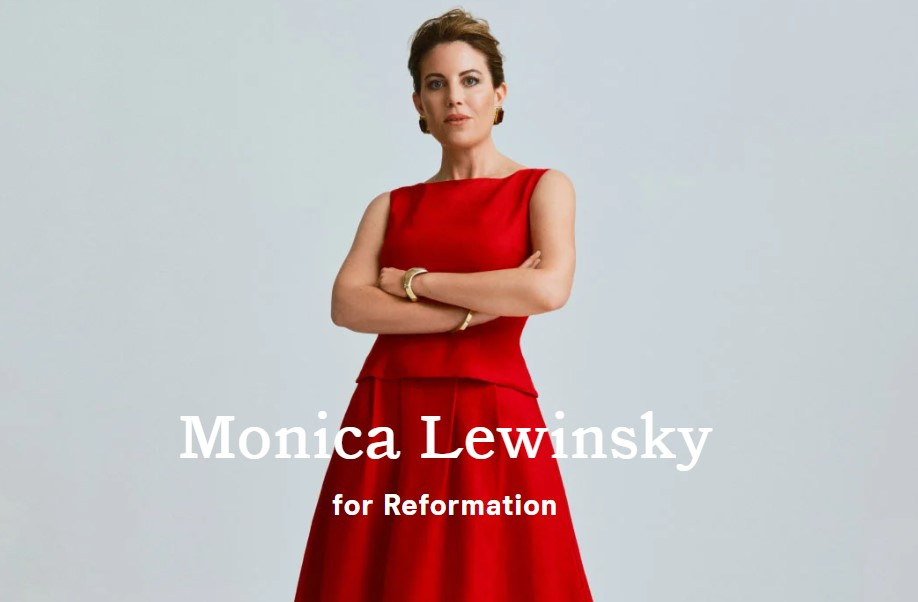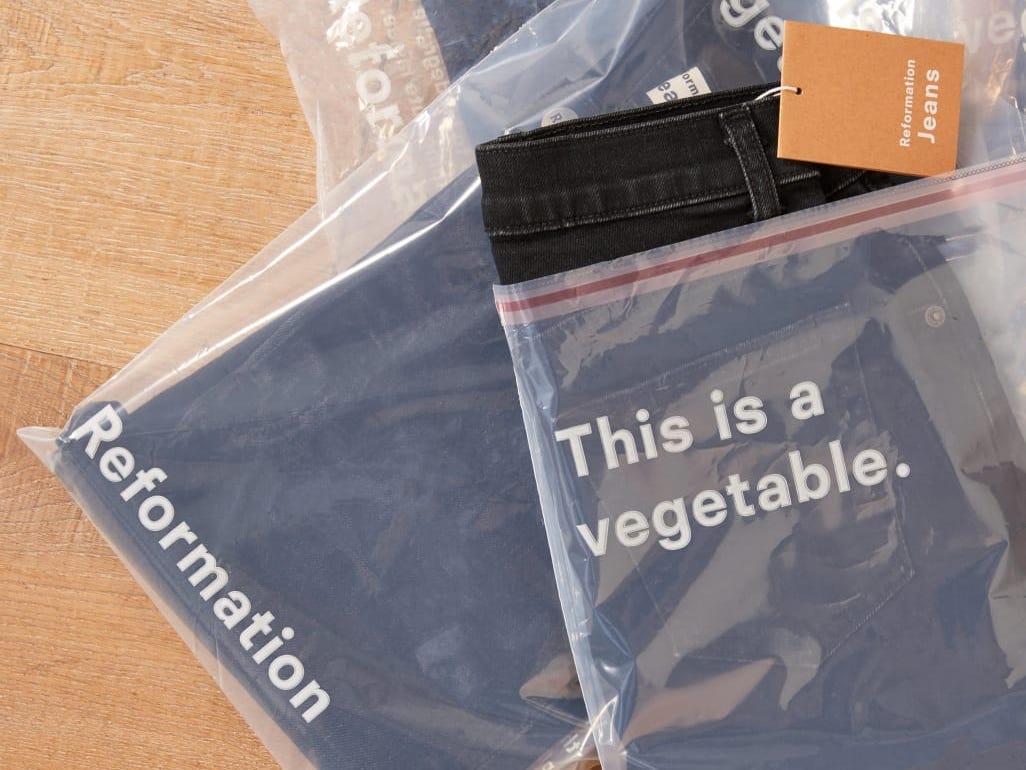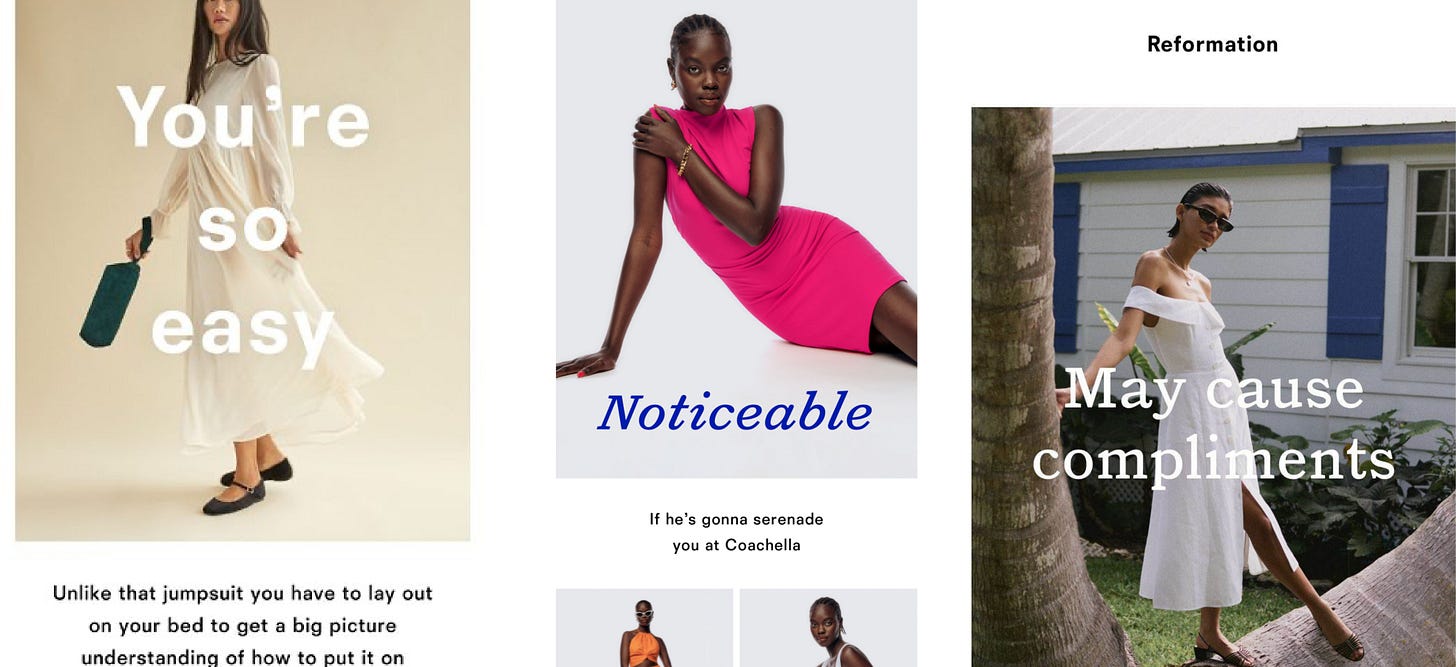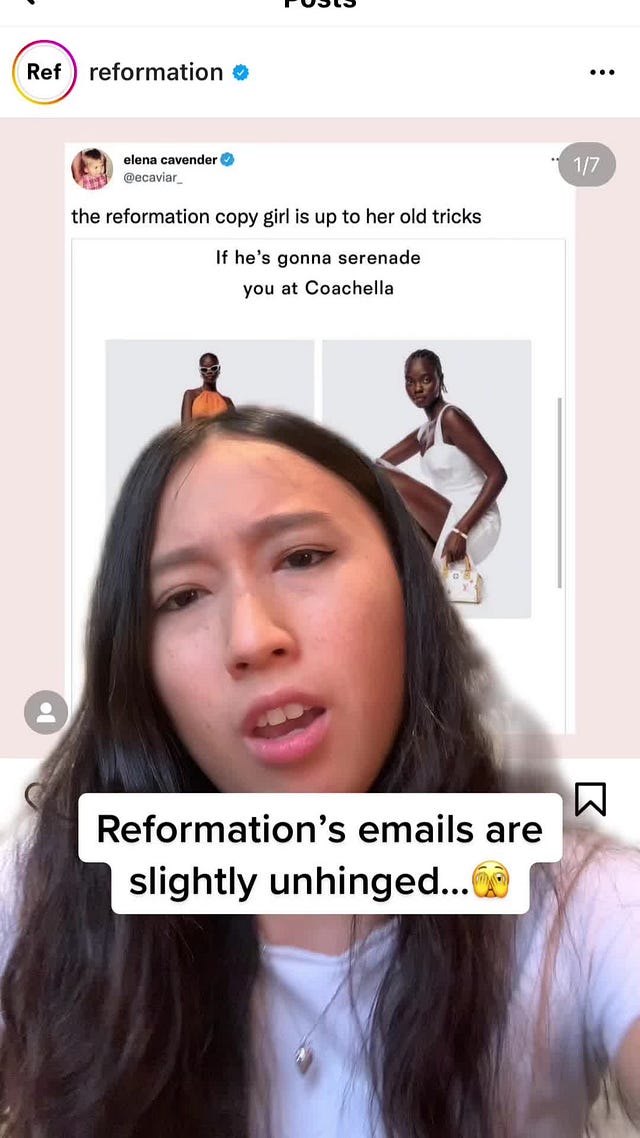👗 Reformation, Fashion Sustainability Hero?
The fashion label Reformation stands for a sustainable conscience when shopping for clothes. What's behind it? My analysis including 3 big learnings about marketingstrateg and sustainability.
Hi 👋 I’m Florian Schleicher. This is the FutureStrategies newsletter. Thank you so much for reading along 💚
Fast fashion is a problem.
And I was part of it.
Most of the clothes we buy are neither good for the planet nor for the people who make them.
10% of global Co2 emissions come from the fashion industry. That's more than all flights and shipping worldwide combined.
A single jean consumes 3,781 liters of fresh water in production.
And every second, the equivalent of a garbage truck full of textiles is incinerated or sent to landfill, while the textile industry produces up to 20 percent of the world's industrial wastewater - mainly due to dyeing processes.
Our love of new clothes costs us the nature in which we often want to wear them.
Brands overproduce goods worth 500 billion dollars every year, and at the end of each season around 12% of clothing remains unsold. A large proportion of these unsold products end up in the Great Pacific Garbage Patch, which now covers 1.6 million square kilometers in the Pacific Ocean between Hawaii and California.
“Most people don’t realize that those items in their wardrobe create about 10 percent of global carbon emissions and cause other environmental damage. We need to raise awareness of the carbon in our closets, and, through education and industry measures, ensure sustainable fashion – rather than fast fashion – becomes the toast of our catwalks.”
Linda Freiner, Chief Sustainability Officer at Zurich Insurance Group
I bought a lot of (cheap) clothes from fast fashion giants like Zara and was sometimes on the lookout for new clothes on a weekly basis. A lot of my WhatsApp conversations with my brother were about the fashion bargains we could get hold of.
👀 Can sustainable clothing be sexy?
But when I started working in marketing for Greenpeace at the end of 2017, I realized for the first time how my own consumer behavior contributes to the fact that our summers are getting hotter and hotter and other people are suffering because of how I buy clothes.
Since then, I rarely buy clothes. And when I do, I only buy from companies that adhere to strict sustainability criteria and have a positive impact on their employees and production chains.
It wasn't easy in 2017 and it felt like there were very few “cool” brands. If I didn't want to conform to the clothing cliché of an eco, I had to spend a lot of time looking for trendy items of clothing.
Quickly I realised how “spoiled” I was from the sheer endless, simple and cheap offer of fashion giants I was. Something that fashion designer Katharina Reuschel also observes:
“Unfortunately, we consumers have been spoiled by fast fashion giants and their marketing over the last few decades. We want something new all the time, and as often as possible. So it has to be cheap. We have forgotten how to appreciate things and keep them as long as possible. That's why it's difficult to get customers interested in products that are genuinely fair and sustainably produced. The much higher price is often a deterrent.
But customers actually have the power to bring sustainability into the product range.”
And even if the offer for sustainable clothing is much bigger and sexier in 2024 - from Nudie Jeans to Veja shoes or underwear from Dedicated - many customers and companies struggle with finding the right way to communicate higher prices.
Especially one thing was hard to come by:
Beautiful and sustainable women's fashion that can be worn on the catwalk, at weddings or in a business context.
Enter: Reformation.
🥈 Being naked is the #1 most sustainable option. We’re #2.
This headline is the slogan of the sustainable fashion brand Reformation, which produces stylish and environmentally friendly clothing.
It is characterized by the use of recycled materials, environmentally conscious production methods and transparency in communicating its ecological impact, thus combining fashion and sustainability.
Compared to the super brands I have analyzed here (Apple, LEGO, Patagonia), Reformation is still very young, but has already built an amazing brand.
Reformation was founded in 2009 by Yael Aflalo in Los Angeles, originally as a vintage boutique before she started designing her own sustainable clothing. Aflalo recognized the enormous environmental impact of the fashion industry and decided to take a different path. Since then, Reformation has specialized in creating fashion that is both trend-conscious and eco-friendly.
If you want to read more about the brand's initiatives, I recommend the company's sustainability page, which is very in-depth and engaging.
I would like to focus here on the brand itself and how it has become a pioneer in sustainable fashion with a clever marketing strategy.
There are 3 particularly exciting aspects that we can learn from.
1️⃣ Coolness meets environmental awareness
2️⃣ Transparent & Purpose-Driven Marketing
3️⃣ E-commerce with enthusiasm
Let's go!
1️⃣ Coolness meets environmental awareness
Reformation has managed to establish sustainability not only as an ethical necessity, but also as a fashion statement.
Their branding conveys a casual, feminine yet confident aesthetic. This “cool girl” image attracts celebrity followers such as Taylor Swift, Meghan Markle and Jennifer Lopez, who have repeatedly been spotted in Reformation outfits.
These celebrity collaborations give the brand an “it” feeling and at the same time promote the hype surrounding its sustainable clothing. The brand succeeds in winning over personalities that others can only dream of.
How do they achieve this? Influencers and VIPs like Monica Lewinsky also want to position themselves as sustainable style icons. And for this, brands need two components: they need to be objectively stylish. And they need to communicate sustainability authentically.
Are influencers always the right approach? No, but it's a perfect fit for fashion labels like Reformation.
At the same time, Reformation also works intensively with micro-influencers (read more about greenfluencers here), who have a smaller but often very engaged audience. Influencers such as Nicole Whittle or Demi Colleen use their platforms to promote Reformation's sustainable fashion in combination with a vegan and conscious lifestyle. This mix of celebrities and micro-influencers increases reach and ensures authenticity.
Slogans like
„Being naked is the #1 most sustainable option. We’re #2”
or texts for their wedding collection
„Unfortunately we can’t give you any marriage advice… but we do make dresses for that sort of commitment.“
show how the brand communicates in a humorous and approachable way.
The tone in all marketing texts is casual, light-hearted and likeable - the target group is clearly self-confident women.
“…these clothes are definitely for confident women who like to feel sexy without losing their chic. It's also based on the women in our lives, the ladies at the company, the ladies in our personal life, our own collection of muses to pull ideas from.”
Brianna Lance, Head Designer @ Reformation
On social media, Reformation could easily fall into the trap of many ecologically-motivated brands, badgering their audience with their message or making them feel guilty.
Instead, Reformation keeps its followers up to date with the company's developments and, above all, makes an effort to be likeable and sympathetic. When you read Reformation's captions and texts, you feel like you're having a quick chat with friends. Typical are tongue-in-cheek and motivating one-liners such as:
“Marble velvet. When regular velvet is too casual”
or
“You might as well look kind of fancy if you’ve already broke a bunch of resolutions by day two.”
Your content is easy to share if it already has a headline that would fit into most young women's feeds.
2️⃣ Transparent & Purpose-Driven Marketing
Why are more and more fashion labels working on becoming or being sustainable?
Young consumers are placing more and more value on “conscious consumption” - 66% of Generation Z state that they are willing to pay more for a sustainable product.

One word is particularly important here: trust
For consumers to spend more money on fewer items of clothing, they need to have confidence that these items are worth the money and are actually sustainable.
Many clothing companies such as H&M, Zara and Shein more or less position themselves as “green” but actually engage in sophisticated greenwashing. They deceive customers and sell the same products as before, just with a green veneer.
Reformation does things differently.
Because their vision is:
“Since 2009, we’ve been on a mission to bring sustainable fashion to everyone.”
I would like to highlight two exciting aspects of how they live this:
⚖️ RefScale
The company positions itself as a brand that wants to change fashion consumption as a whole. Transparency is a key element of this, as they openly inform customers about the environmental impact of their products and processes.
The “RefScale” on the website transparently shows the ecological footprint in CO2 and water consumption of each item. Reformation works with external experts who check and certify the company's methodology.
✅ Sustainability Reports
Reformation regularly publishes sustainability reports in which it outlines its progress, challenges and goals in the area of sustainability.
Nothing extraordinary so far.
But their sustainability reports are characterized by a very high level of detail and measurable information about their ecological footprint. They compare progress year on year and set themselves apart from other companies with clear metrics.
RefScale is also repeatedly used here.
At the same time, Reformation gains authenticity because they not only write transparently about their successes, but also about the areas in which they want to improve or have challenges in their reports. The reports include concrete action plans for improvement, as well as the obstacles they face along the way. This honest communication gives the brand credibility and sets it apart from companies that only emphasize their successes.
And I find this last point particularly exciting:
Reformation's sustainability reports are visually appealing and written in easy-to-understand language, which makes them accessible to consumers who are not deeply involved in sustainability. Many other reports are more technical in nature and can be difficult for non-experts to understand.
As a result, the fashion label even uses the reports on their social media presence in an entertaining and authentic way:
Reformation's sustainability reports are visually appealing and written in easy-to-understand language, which makes them accessible to consumers who are not deeply involved in sustainability. Many other reports are more technical in nature and can be difficult for non-experts to understand.
As a result, the fashion label even uses the reports on their social media presence in an entertaining and authentic way:
I have written more about the potential of using sustainability reports in marketing here ⬅
3️⃣ E-Commerce with excitement
The most important e-commerce channel for many online stores also appears to be newsletter marketing for Reformation. Their email marketing strategy is characterized by a tone-of-voice that resonates with their primary target group, especially millennials.
With a frequency of 2 to 3 emails per week, Reformation takes a casual and playful approach that translates seamlessly across communication channels, including subject lines and campaign content.
This unmistakable tone sets Reformation apart from others.
What's more, the brand has achieved the rare feat of getting people excited about reading marketing emails. Each email not only features the latest fashion pieces, but also tells a compelling story.
The brand's emails are not only about showcasing the latest fashion offerings, but also about educating the audience about the environmental impact of the fashion industry. By seamlessly blending fashion with a commitment to sustainability in a friendly and accessible way, Reformation has managed to capture the attention and engagement of its younger audience - a remarkable achievement at a time when consumers are bombarded with marketing messages.
Here too, sustainability is not dogmatically pressed into every aspect, but used where it really makes sense:
“We always try to weave [our sustainability practices] into everything we do, but there are certain moments where it’s not relevant, like an announcement that a dress is back in stock. Is that an opportunity to talk about sustainability? Not really. But we like to include it wherever it does make sense, and we’re always thinking up new ways to do that. Hammering in how our production saves water gets repetitive.”
Yael Aflalo, Reformation’s Gründerin
Reformation's texts are witty, clever and thought-provoking, making reading an email from the brand an enjoyable experience.
While other e-commerce sites inundate recipients with boring and formulaic marketing content, Reformation's texts stand out from the crowd and provide a breath of fresh air.
There is also a content mix on social media that other brands rarely dare to use: Beautiful clothing is mixed with authentic and approachable entertainment content.
The focus is on relatable yet trendy content that integrates subscribers into their everyday lives. In this way, the brand creates a connection with its target group and its authenticity sets it apart from other fashion brands, which often rely exclusively on highly polished images.
By responding quickly to almost every user comment, the brand shows that it cares about its community and consistently thanks them for their help. The curated hashtag #jointhereformation is not used aggressively.
Instead, the brand is trying to create a community of people who are interested in changing the way the world shops. It gives useful and positive tips on how to live more sustainably in certain places without lecturing or shaming those who don't.
Instagram Stories include a highlight titled “You guys in Ref”, in which Reformation shares user-generated content and celebrates her customers.
💚 What can we learn from Reformation?
In just a short time, Reformation has managed to become a beacon for sustainability in the fashion industry.
Yet they are far from perfect - and they never say they are.
So what can we learn from their successes?
Here are my 3 highlights for all our (sustainability) marketing:
1️⃣ Authenticity and approachability are crucial: Reformation shows that informal and authentic content, both in photography and text, can build a strong emotional bond with the target group. Influencers convey credibility and by being open about potential improvements, trust in the Reformation brand increases. This all starts with a clear understanding of the target group. Because only if we know what is important to them can we respond to them.
3️⃣ Communicate a clear vision: Visions are the key to a good marketing strategy. And when brands have such an overarching goal, it must be lived. Reformation integrates its sustainable message into all marketing channels, creating a strong brand identity that appeals to consumers not only because of the products, but also because of the values.
5️⃣ Creative, cheeky messages attract attention: with humorous and provocative slogans, Reformation stands out from the competition and remains present in the minds of consumers. Stories are consistently conveyed through all touchpoints and the brand shows that it remains true to its values. Marketing works! With the right messages, target groups can be inspired in the long term - even for newsletter marketing.
Reformation is a great example of a holistic and strategic approach to brand building that is both progressive and pragmatic.
Do you want to excite your target audience like Reformation does?
Then I would be happy to get to know you and your projects and help align your marketing strategically and sustainably with my marketing studio FUTURES.
Simply contact me directly here or take a look at who we work for.
In my view, Reformation is a trendsetter that shows how brands can grow through clever marketing and a commitment to principles that resonate with a discerning clientele.
🔚 Some last words
The fashion industry has a problem.
And we all have our consumer power to move it.
Meanwhile, we can also claim this responsibility because there are brands like Reformation that make trendy, cool and sexy fashion that doesn't cost us the earth.
Yes I know, it's so much easier to go to the nearest high street and buy fashion in the same store as always.
But if you're thinking to yourself now,
“Okay, I'm a person who wants to buy sustainably.”
...then here are a few links to make the search for your next favorite piece easier:
Faircado - a search engine for pre-owned garments
Good On You - a directory for sustainable fashion labels
The Good Trade - a blog full of sustainable fashion trends and labels
Happy shopping and thanks for reading,















